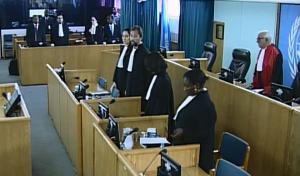The Appeals Chamber of the International Residual Mechanism for Criminal Tribunals, composed of Judge Theodor Meron, presiding, Judge Bakone Justice Moloto, Judge Christoph Flügge, Judge Burton Hall, and Judge Liu Daqun, delivered today its judgement on the appeal lodged by Augustin Ngirabatware.
The judgement delivered today is the first appeal judgement delivered by the International Residual Mechanism for Criminal Tribunals, which was established by the Security Council of the United Nations to take over functions of the International Criminal Tribunal for Rwanda and the International Criminal Tribunal for the former Yugoslavia, which are in the process of completing their mandates.
On 20 December 2012, Trial Chamber II of the International Criminal Tribunal for Rwanda convicted Ngirabatware of committing direct and public incitement to commit genocide based on his speech at a roadblock on the Cyanika-Gisa road in Nyamyumba Commune on 22 February 1994. It also found him guilty of instigating and aiding and abetting genocide based on his role in distributing weapons and his statements at two roadblocks in Nyamyumba Commune on 7 April 1994. Ngirabatware was also convicted, under the extended form of joint criminal enterprise, of rape as a crime against humanity based on the rape of a Tutsi woman by members of the Interahamwe. The Trial Chamber sentenced Ngirabatware to 35 years of imprisonment.
The Appeals Chamber unanimously affirmed Ngirabatware’s conviction for direct and public incitement to commit genocide. A majority of the Appeals Chamber also affirmed Ngirabatware’s conviction for instigating and aiding and abetting genocide. However, the Appeals Chamber found that the Trial Chamber erred in expanding the charges in relation to Ngirabatware’s contribution to a joint criminal enterprise to exterminate the Tutsis. The Appeals Chamber also found that, since the Prosecution failed to prove at trial Ngirabatware’s contribution to the common purpose of exterminating the Tutsi civilian population pleaded under the count of extermination, Ngirabatware’s conviction for rape pursuant to the extended form of joint criminal enterprise could not be sustained. The Prosecution did not appeal the Trial Chamber’s findings on the count of extermination. As a consequence, the Appeals Chamber unanimously reversed Ngirabatware’s conviction for rape as a crime against humanity under the extended form of joint criminal enterprise. In light of this reversal, the Appeals Chamber reduced Ngirabatware’s sentence to a term of 30 years of imprisonment.
Ngirabatware was born in Nyamyumba Commune, Gisenyi Prefecture, Rwanda. During the relevant period in 1994, Ngirabatware served as Minister of Planning in the Rwandan government.


